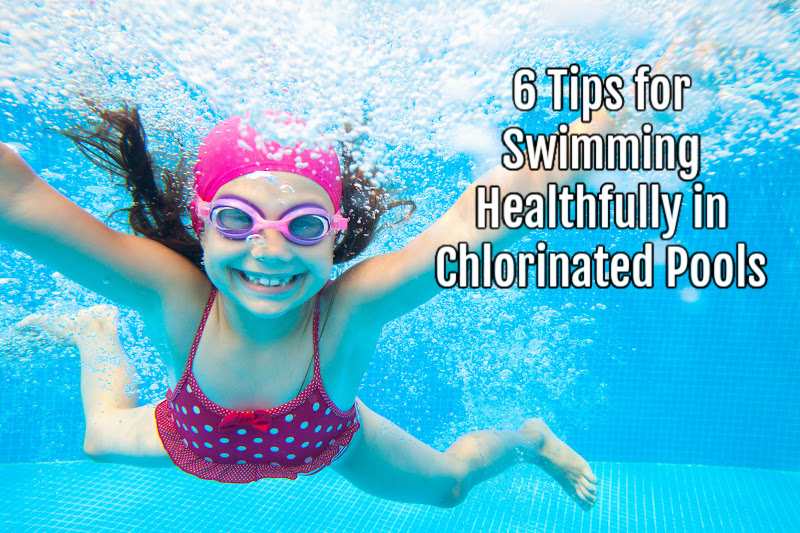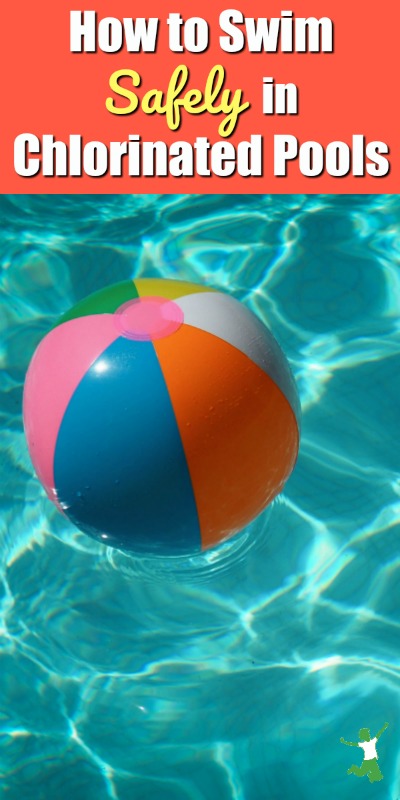The reasons why swimming in chlorinated pools is dangerous to health and the 6 steps to take to protect yourself and your family while still enjoying water fun all summer long.

The reasons why swimming in chlorinated pools is dangerous to health and the 6 steps to take to protect yourself and your family while still enjoying water fun all summer long.
An important topic to explore as we head into the summer season is chlorinated pools.
Chlorine is popular because it handles the three main jobs in keeping a swimming pool clean: It sanitizes (kills bacteria and germs), oxidizes (controls organic debris from perspiration and body oils), and deters algae. The chemical is unpopular, however, because it has a strong odor, reddens eyes, causes allergic reactions in some swimmers, and is a known carcinogen – meaning it has been linked to cancer!
Chlorine absorbs into your skin. Too much exposure to chlorine has been linked to major health problems including reproductive disorders and even birth defects. It can cause your skin and hair to dry out and over time too much exposure can even cause wrinkles.
Editor’s Note: Have you ever wondered why Olympic swimmers seem to have so many wrinkles at such young ages and most of the men start losing their hair so quickly? Could it, in fact, be caused by overexposure to chlorine for so many years and so many hours every day? Perhaps so.
When chlorinated pools are indoors, toxic gases such as nitrogen trichloride are released, which can be very dangerous. When we breathe in this gas it can cause severe damage to the lining of the lungs which could lead to respiratory problems or asthma. This toxic gas can be harmful at any age yet it poses the most risk to elderly people and small children.
So while chlorine used to disinfect swimming pools is widely recognized as a health hazard, not everyone has access to the ocean or a lake, or pools treated with ozone, ionizers, bromine, silver-cooper, or other alternatives which can frequently be much more expensive.
6 Tips to Protect Health in Swimming Pools
If you or your family members do choose to swim in chlorinated pools, some recommendations I’ve read are to:
1. Swim in outdoor chlorinated pools only if at all possible. It is much safer because the toxic gases are mostly eliminated in the open air.
2. Swim in chlorinated pools occasionally. It is regular exposure to chlorinated pools that presents the greatest risk to health.
3. Shower immediately before and after using a natural Castile soap.
4. Drink plenty of home-filtered water (better than bottled!) beforehand so that you are well hydrated.
5. Consider wearing a mask and snorkel to shield your eyes – and even a wetsuit, if you are willing to go that far!
6. Get fresh air afterward so you don’t continue to inhale the fumes, and can clear your lungs.
Why shower immediately before swimming in a chlorinated pool?
Julie Deardorff explains in her article published in the Chicago Tribute, “Another important reason to shower is that our bodies generally contain residue from consumer products, including perfume, make-up, body lotion, shampoo, and sunscreen.
When the chemicals used to disinfect the pool mix with organic matter (sweat, hair, urine) or nitrogen-rich substances (commonly found in consumer products) it can create a more toxic agent, said Michael Plewa, a professor of genetics at the University of Illinois whose new research has linked pool chemicals to health problems, including asthma and bladder cancer.”
Red, burning, itchy eyes and skin?
What I’ve read is that the presence of chloramines can cause reactions such as red, burning, irritated eyes: Chloramines form when chlorine reacts with ammonia. Ammonia enters the pool through sweat and urine. It is important to teach children not to urinate in pool water [even though it is chlorinated].
Also, showering before swimming can remove excess sweat that interacts with chlorine. My understanding is that if the sweat is on your skin, and hasn’t been rinsed off first in the shower, the chlorine will interact with the sweat on your skin as you enter the pool, and may result in some folks getting itchy skin.
So, what do you think? Do the benefits and joy of swimming and playing in a pool outweigh the health risks of chlorine?

Additional articles on this topic
The Dangers of Chlorine
Asthma In Swimmers
Swimming Pools May Increase Cancer Risk
The Hidden Danger of Swimming Pools
Swimming Pool Alternatives to Chlorine
Water Birth Dangers








I always paint some iodine on my kids’ skin after swimming since chlorine displaced iodine in the body and increases deficiency.
What about using vitamin C topically immediately after swimming? I understand it neutralizes the chlorine still on the skin after swimming.
What about saltwater pools?
Informative article. I never realized the reason behind “shower before swimming”.
Great tips!
Enzymes are the answer to escaping chlorine by-products and lowering the amount of chlorine in swimming pools!
Chlorine is very unpleasant, but it is NOT carcinogenic. Look it up.
I’m finding that there is a lot of uninformed and unqualified opinion on the internet. A friend just told me that you have to shower after the pool because you have to get the Cl out of your body. I can understand if your hair is still wet there’s still Cl there. But if you’ve dried off, all the Cl on your skin would already be absorbed into the skin and a shower would not remove it.
Great information, thank you! It’s overwhelming with the amount of caution you have to take now to enjoy things. I wish it were as simple as the non-toxic alternative becoming the norm and banning the hazardous option. Wishful thinking, I guess.
Maybe that is why saltwater pool set ups are becoming so popular now
Saltwater systems create their own chlorine, instead of having to add chlorine to the water.
Very interesting this article…. I have been taking my 8 year old to my local YMCA and sometimes I am concerned because she wants to stay in swimming pool almost 2 hours. I was wondering how long it is recommendable to stay in the pool (indoors),,, To be honest, I am also concerned about the chlorine effect but she loves swimming. I got also al inflatable swimming that I prefer instead of the chlorinated one. Please, advise me what is the maximum time to stay in a pool.